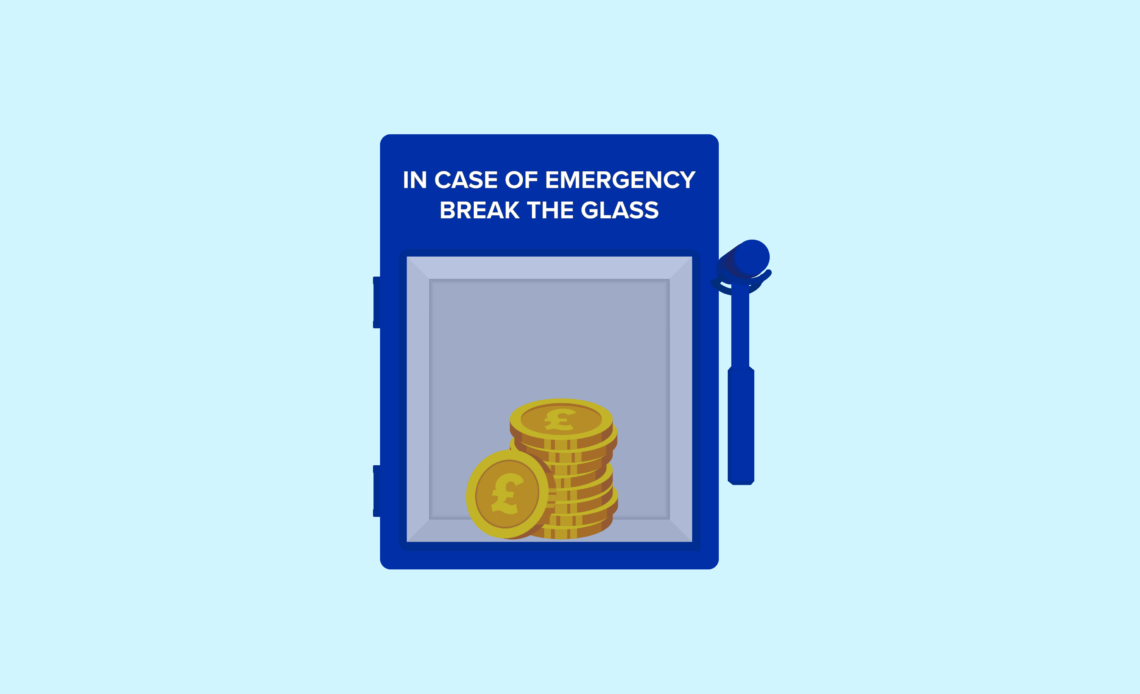
It is a fact of life that we all incur unexpected expenses, sometimes at the most inopportune times too. Your car might break down, your windows might need replacing, or your computer decides it’s had enough.
As a result, it is always a smart idea to have some emergency savings to act as a buffer.
Despite what you may think though, there is such a thing as too much emergency cash (more on that later).
We put together this quick guide on how to put away money for your emergency fund.
What Is an Emergency Fund?
An emergency fund is exactly what it sounds like. It’s a special fund of money that you save up in case you run into some unexpected expenses. Emergency funds are commonly used to pay for things like :
- Car repair
- Home repairs
- Emergency bills (e.g. dentist, vet, etc)
- A safety net in case of job loss
Emergency funds are useful because virtually everyone will run into some financial emergency in their life at some point. So being prepared and having some cash set aside prevents you from falling behind.
Do I Need an Emergency Fund?
Yes, everyone should have some kind of emergency fund. If you are able to save some of your wages every month, then you should always set aside at least some into your emergency fund. Ideally, you will never have to use it but you never know when it might come in handy.
On the other hand, saving up for an emergency fund is not always the best idea.
For example, if you have a lot of outstanding debt, then your interests would probably be best used trying to pay off that debt first before creating an emergency fund.
Likewise, you can reduce your need for an emergency fund if you have insurance. For example, homeowners insurance can insulate you from many of the costs of owning a home, thus making an emergency fund for home repairs not needed.
In general, though, most people will need an emergency fund for some things, whether it’s a job loss, unexpected property damages, or medical bills.
How Much Money Should I Have in My Emergency Savings?
The general rule of thumb is that you should have anywhere between three to six months worth of expenses in your emergency fund.
If you earn a higher wage at your job and have good employment prospects, then three months worth of expenses should be enough. Alternatively, if you have unstable employment or have a variable income then six months’ worth of rent is probably a good buffer. As always, these are guidelines and may not be the optimal choice for everyone.
Let’s put some numbers to this rule.
As of 2019, the median weekly earnings for full-time employees was around £585.
In general, financial experts recommend that you have a cash “buffer” that is distinct from your emergency fund proper.
This buffer should cover about 1-2 weeks of pay, so £585- £1170.
When calculating how much you need in your emergency fund, take your monthly total for living expenses and multiply it by 3-6. That should give you a good estimate of how much money you will want saved up.
For example, as of 2020, a single working professional with no children living in London has an estimated average monthly expense of about £2,973. So a good three-month emergency fund for a single person living in London would be about £9,000. A six-month emergency fund would be about £17,800.
These numbers are pretty high but that is because London is the most expensive city in the UK and one of the most expensive cities in Europe. If you live in a smaller town, then your emergency fund does not have to be nearly as much.
For instance, as of 2020, the average monthly expense for a single person living in Manchester is around £1,700. Thus, a good emergency fund for a person living in Manchester would be about £5,000-£10,000 for three to six months worth of expenses.
Again, these are estimates and can fluctuate depending on your financial circumstances. If you have insurance for any big-ticket items, then you may not need as much in your emergency fund. Likewise, if you have an in-demand job and can find employment quickly, then your money fund does not have to be as large.

How To Make an Emergency Fund
First things first, you need to set up a dedicated savings bank account at your bank. You want to keep your emergency fund separate from your main account so you don’t actually eat into those savings without noticing it. Most UK banks will let you open a basic savings bank account for free with no monthly fee.
The absolute best way to save is to take a chunk of every paycheck and put some of it away before you get the chance to spend it. Most banks will allow for some kind of auto-deposit feature so you can set them up so you automatically put some money away in your savings account whenever you get paid. That way you won’t have to manually deposit funds.
You can set up a standing order for a flat amount each month or you could have a sweeping service that automatically transfers amounts that exceed a certain level.
You should also look for an account that has a decent interest rate. Earning interest on your savings will boost your balance and give you even more cushion. As of July 2020, the average annual interest rate for an account is about 0.23%. So if you have £1,000 saved then over a year it would accrue about £2.30 in interest.
Now, that does not sound like much at first, but keep in mind that compound interest grows exponentially. The longer you have your funds saved, the more interest it will gain over time. Moreover, interest helps build your funds without you having to do anything. You can just let the money sit and it will grow.
Some accounts have a higher interest rate but some accounts will require you to keep the money deposited for a fixed term and won’t let you withdraw it until then. These kinds of fixed-rate bonds are typically not suited for emergency funds because you don’t have immediate access to your money when you need it.
You can also opt for a cash ISA. These kinds of accounts often come with nifty tax-benefits. Your funds will grow tax-free and you only pay taxes on them when you actually take the money out.
Along with your regular savings deposits, you should also make sure you boost your savings with any extra money you have. You may want that extra-large plate of fish and chips but think about it; that’s £15 that could go into your account and accrue interest.
Can I Have Too Much Emergency Savings?
While having emergency savings is never a “bad thing” per se, particular ways of saving are less efficient than others and can lead to some drawbacks.
First, if you invest a ton of money into a savings account with a very low interest rate, then you can actually lose money to inflation as inflation overtakes the interest rate. Thankfully, the Bank of England usually tries to set base interest rates to outpace inflation.
Also, if you put all your money into a regular savings account then you could be missing out on the benefits of tax-advantaged accounts. You would be missing out on all the potential extra money from investment gains. Investment gains can easily be 4-5 times higher than interest gains.
So it’s not that you have too much emergency savings, you just need to make sure you are saving efficiently in a way that maximizes your funds.
Others Ways to Deal With Unexpected Costs
In addition to saving, here are a few other ways that can help you manage unexpected costs.
- Prune your expenses. More often than not, people spend more than they have to. Cutting out extraneous expenses like eating out or going to the movies can be a way to loosen up some of your income
- Insurance. Insurance for big-ticket items can be a godsend in cases of emergencies. A small monthly premium can cover you in the case of car or home damages, for instance. That way you won’t have to pay out of pocket for really expensive things.
- Personal loans. When used properly, personal loans can be an efficient method of covering unexpected costs. Be careful though, if used improperly than personal loans can add substantially more to your debt.
- Pay off debts. Sometimes it may be in your best interest to first pay off any outstanding debts before saving. Depending on the size of the debt, paying off your debts quickly might actually save you more money in the long run than compared to a savings account with interest.
- Credit Card. A decent credit card can give you access to extra capital in case you have emergency expenses.
- The 9 Best UK Money Management Apps (2025) – for individuals and couples - August 8, 2024
- What Salary Should You Be Making At Your Age? (UK Guide) - August 8, 2024
- The Top 10 Most Ethical Banks in the UK: A Comprehensive Review for 2025 - August 8, 2024
